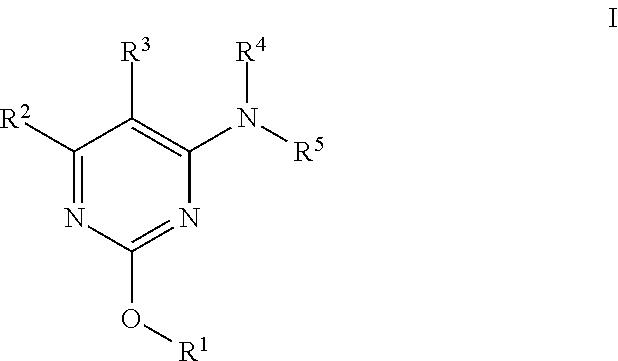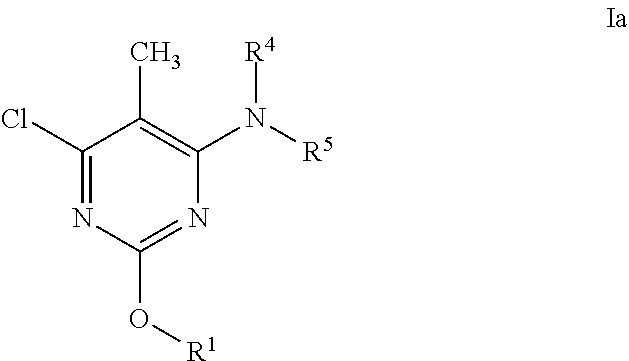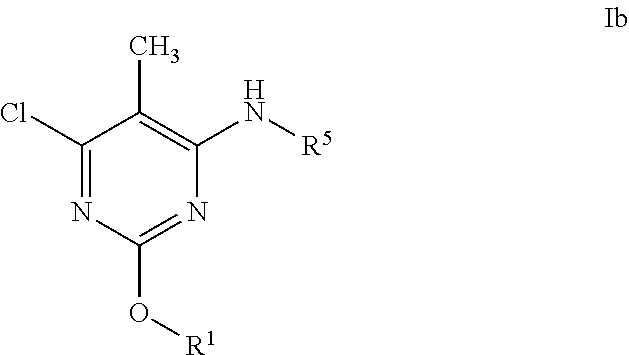Alkoxy pyrimidine pde10 inhibitors
a technology of alkoxy pyrimidine and pde10, which is applied in the field of compounds, can solve the problems of high non-compliance or discontinuation rate of medication, lack of efficacy, and dissatisfaction with therapy
- Summary
- Abstract
- Description
- Claims
- Application Information
AI Technical Summary
Benefits of technology
Problems solved by technology
Method used
Image
Examples
example 1
[0126]
6-chloro-N-[(2,4-dimethylthiazol-5-yl)methyl]-5-methyl-2-methylsulfonyl-pyrimidin-4-amine (F5)
[0127]6-chloro-N-[(2,4-dimethylthiazol-5-yl)methyl]-5-methyl-2-methylsulfanyl-pyrimidin-4-amine F4 (1.36 g, 4.32 mmol) was placed in a 250 mL flask and diluted with dichloromethane (100 mL). To the resultant slurry was added mCPBA (1.49 g, 8.64 mmol), and the solution was stirred for 1 hr. 1 N aqueous NaOH (100 mL) was then added, and the organic layer was separated and concentrated in vacuo to give 1.3 g (87%) of F5 as a white foam. MS (Electrospray): m / z 347.8 (MH+).
2-[3-(1H-benzimidazol-2-yl)propoxy]-6-chloro-N-[(2,4-dimethylthiazol-5-yl)methyl]-5-methyl-pyrimidin-4-amine (F6)
[0128]6-chloro-N-[(2,4-dimethylthiazol-5-yl)methyl]-5-methyl-2-methylsulfonyl-pyrimidin-4-amine F5 (480 mg, 1.384 mmol) and 3-(1H-benzimidazol-2-yl)propan-1-ol (244 mg, 1.38 mmol) were placed in a 20 mL vial and dissolved in THF (5 mL). A 1 M solution of NaHMDS in THF (1.38 mL, 1.38 mmol) was added, and the re...
example 2
[0129]
2-[(4-chloro-6-{[(2,4-dimethyl-1,3-thiazol-5-yl)methyl]amino}-5-methylpyrimidin-2-yl)oxy]ethanol (G1)
[0130]6-chloro-N-[(2,4-dimethylthiazol-5-yl)methyl]-5-methyl-2-methylsulfonyl-pyrimidin-4-amine F5 (2.2 g, 6.34 mmol) and ethylene glycol (394 mg, 0.348 mL, 6.34 mmol) were placed in a round-bottom flask and dissolved in THF (60 mL). A 1 M solution of NaHMDS in THF (6.34 mL, 6.34 mmol) was added, and the reaction was stirred overnight. Solvent was then removed, and the product was purified by silica gel flash column chromatography (EtOAc / hexanes gradient). 1.42 g (68%) of F6 were isolated as a pale yellow oil. MS (Electrospray): m / z 329.1 (MH+).
{6-Chloro-5-methyl-2-[2-([1,8]naphthyridin-2-yloxy)-ethoxy]-pyrimidin-4-yl}-(2,4-dimethyl-thiazol-5-ylmethyl)-amine (G2)
[0131]2-[(4-chloro-6-{[(2,4-dimethyl-1,3-thiazol-5-yl)methyl]amino}-5-methylpyrimidin-2-yl)oxy]ethanol G1 (17 mg, 0.052 mmol) and 2-bromo-1,8-naphthyridine (11 mg, 0.053 mmol) were placed in a test tube and dissolved in...
example 3
[0132]
methyl(2E)-3-(quinolin-2-yl)prop-2-enoate (G5)
[0133]To a solution of 2-quinolinecarboxaldehyde (10 g, 64 mmol) in 200 mL THF was added trimethylphosphonoacetate (11.0 mL, 76 mmol) and then sodium hydride (3.05 g of a 60% suspension in oil, 76 mmol). After stirring for 3 h at room temperature, the reaction was quenched by the addition of a saturated ammonium chloride solution. The mixture was extracted twice with EtOAc, the combined organic layers were washed with brine, dried over Na2SO4, filtered and concentrated. The residue was suspended in ˜75 mL Et2O and to that was added ˜125 mL hexanes and the mixture was placed in the freezer. The solids were collected by filtration to provide 8.46 g (62%) of G5 as a pale orange solid. MS (Electrospray): m / z 214.3 (MH+).
3-(quinolin-2-yl)propan-1-ol (G6)
[0134]Methyl(2E)-3-(quinolin-2-yl)prop-2-enoate G5 (2.37 g, 11.1 mmol) dissolved in 100 mL THF was cooled to 0° C. and treated with a 1M solution of LAH in THF (33.3 mL, 33.3 mmol) dropw...
PUM
| Property | Measurement | Unit |
|---|---|---|
| catalytic domain homology | aaaaa | aaaaa |
| PKA | aaaaa | aaaaa |
| enantiomers | aaaaa | aaaaa |
Abstract
Description
Claims
Application Information
 Login to View More
Login to View More - R&D
- Intellectual Property
- Life Sciences
- Materials
- Tech Scout
- Unparalleled Data Quality
- Higher Quality Content
- 60% Fewer Hallucinations
Browse by: Latest US Patents, China's latest patents, Technical Efficacy Thesaurus, Application Domain, Technology Topic, Popular Technical Reports.
© 2025 PatSnap. All rights reserved.Legal|Privacy policy|Modern Slavery Act Transparency Statement|Sitemap|About US| Contact US: help@patsnap.com



